



 |
  |
 |
|
Beatlemania Everyhead |
Jesucristo Superstar Jesus Christ Superstar |
Nia Ben Aur Nu Ska Vi Sjunga |
The Rocky Horror Show Romantic Moog |
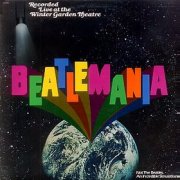 |
Beatlemania (Recorded Live at the Winter Garden Theatre) (1978, 66.13) ***/T½ |
||
| I Want to Hold Your Hand She Loves You Help Can't Buy Me Love Day Tripper Yesterday Eleanor Rigby Nowhere Man |
Strawberry Fields Forever Penny Lane Magical Mystery Tour Lady Madonna Fool on the Hill Got to Get You Into My Life Michelle Get Back |
All You Need is Love Revolution Hey Jude I am the Walrus The Long and Winding Road Let it Be |
|
Current availability:
Mellotron used:
Beatlemania can probably be hailed as the first example of a '90s phenomenon, fifteen years early: the tribute band. Rather than a touring unit (at least initially), the ersatz Beatles took up residence in New York, originally at Broadway's Winter Garden Theatre, for just over a thousand performances, taking the audience through the band's career in under ninety minutes, including (in fact, especially) their post-touring years. It's difficult to overestimate the market for anything Beatle-related, particularly in the States, so the show's popularity should come as no surprise, despite the band not actually sounding that much like The Beatles, particularly in the vocal department.
The decision was taken to record the show, most of it making its way onto '78's Beatlemania (Recorded Live at the Winter Garden Theatre), which apparently sold well at the time, almost certainly mainly to people who'd just been blown away by the show, who played it maybe twice before going back to the superior originals, in the way of most tribute act albums. The band do a decent enough job of spitting out note-for-note covers night after night, although the 'Liverpudlian' accents on display are woeful and the occasional American intonation slips through. I know there were offstage musicians involved, but I've no way of knowing whether the string, brass and woodwind parts on many tracks were live, or the band were playing along to tapes.
Les Fradkin was the show's first 'George Harrison', playing Mellotron on several tracks, with a brief string line on Eleanor Rigby, alongside the real (taped?) strings, the expected flutes on Strawberry Fields Forever (of course) and Fool On The Hill and strings on All You Need Is Love, although all other orchestral parts seem to be real or taped. It doesn't seem likely that anyone's going to reissue a tribute album of rather variable quality on CD, but I'd imagine NYC-area second-hand shops probably have a pile of them holding up the counter. Or maybe not? For all I know, this is now impossibly rare, but you'd have to be a pretty hardcore Beatles fan to want to shell out very much for this; either that, or the kind of obsessive who just has to hear how the band assimilated the Mellotron's sound into the show (ahem).
See: The Beatles | Les Fradkin
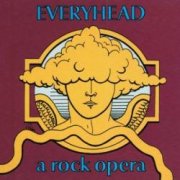 |
Everyhead: A Rock Opera (1975, 69.24) **½/TT |
||
| Overture When Your Soul's Your Own Ballad of the Fucking Trees The Garage Mommie Love Saturday Night The Dream The Nightmare Iffa Wanna |
Hold on to Yourself Trying Daddie Sir Fidelity You Stole Away My Head America is a Pig The Ballet of the Deadly Sins Shoobie I Get Excited (Soul Soup) |
The Office The Chicken Song Diesel Woman Blues Gimme Your Body The Exit Last Recourse There Could Have Been More Everyman's Hymn Put Away the Masks (Finale) |
|
Current availability:
Mellotron used:
It's difficult to know where to start when discussing Everyhead: A Rock Opera:
So, er, what is it, then? Pretty much what it says on the tin: a seventy-minute 'rock opera', featuring a slew of vocalists playing various roles and a largish band, the only member of whom rings any bells being Steppenwolf's Michael Monarch, one of three credited guitarists. Musically, it starts well, Overture being exactly what it says, giving us some decent prog moves; sadly, however, after a promising start, the 'opera' quickly descends into Midwest, mid-'70s boogie, like a restricted-budget Skynyrd, perhaps, much of the music clearly subservient to the story, particular low-points including the ridiculous mock-operatic female lead on Mommie Love and the messy, ten-minute opera-within-an-opera The Ballet Of The Deadly Sins. On the upside, we get some great fuzz bass on Saturday Night and excellent synth (ARP 2600?) experimentation on The Nightmare, while Overture really is very good. And, of course, the Mellotron.
Cottrell plays Mellotron here and there, with string swells and flutes on Overture, some nice string pitchbends on Iffa Wanna that remind me of Crack the Sky's subsequent work, not to mention a great flute solo, more heavily-reverbed strings on You Stole Away My Head, another flute solo on Everyman's Hymn and a flute/strings combo on closer Put Away The Masks (Finale). Top Mellotron track? Iffa Wanna, no contest. So; do you bother? It's all a bit off-Broadway, really, more Hair than Head, so to speak, although it definitely has its moments, admittedly, mostly Mellotronic ones.
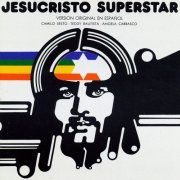 |
Jesucristo Superstar (1975, 92.15) **/T½ |
||
| Obertura Canción de Judas Dinos Lo Que Va a Pasar Realmente Extraño Todo Estará en Paz Jesús Morira Hosanna Simón Zelotes Pobre Jerusalén |
Sueño de Pilatos Templo Es Más Que Amor Di Que Me No Condenaré Última Cena Getsemaní Arresto Negaciones de Pedro Palacio de Pilatos |
Canción de Herodes Todo Ha Sido un Sueño Muerte de Judas Juicio Ante Pilatos Superstar Crucifixión Juan Diecinueve Cuarenta y Uno |
|
Current availability:
Mellotron used:
Everyone knows something from the appalling Andrew Lloyd Webber's horrid Jesus Christ Superstar, don't they? His third rock opera/concept album/musical/whatever, it's the kind of thing that people who don't actually like rock at all listen to, telling themselves how radical they're being. It's actually 'rockier' than you might expect, especially if you've only heard Lloyd Webber's later works, which isn't to say it's actually 'rock' in the accepted sense of the word, even if Ian Gillan sang the title role on the original album. After becoming an unbelievably massive hit in the English-speaking world, it spread out across the world, including a Spanish-language version, released in 1975 as Jesucristo Superstar.
Teddy Bautista (Canarios, Taburiente) was apparently musical director of the show, playing keyboards, including Mellotron, despite the presence of both an orchestra and a choir. It's the first thing you hear on the soundtrack, providing the massive strings pitchbend that opens Obertura, with 'stabs' later on in the track, choirs on Todo Estará En Paz, strings on Sueño De Pilatos and, in its only appearance on disc two, choirs again on Crucifixión, manipulated in the studio to give a seemingly 'infinitely sustained' effect (ah, that old trick...).
Who, outside Spanish-speaking Lloyd Webber aficionados, would want to hear this album? Buggered if I know... The music's going to be pretty much the same as on the original album, albeit with Spanish lyrics and given that it's a studio creation, not the live album I'd expected, there isn't even much Mellotron on it. It's on CD, but I really, really wouldn't go out of your way to hear it. Seriously.
See: Canarios
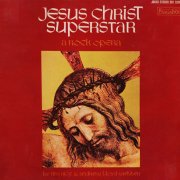 |
Jesus Christ Superstar (1971, 43.48) **/TTT |
|
| Hosanna Simon Zealotes/Poor Jerusalem Everything's Alright Heaven on Their Minds What's the Buzz/Strange Thing Mystifying This Jesus Must Die Everything's Alright King Herod's Song |
Judas' Death I Don't Know How to Love Him Superstar/Crucifixion |
|
Current availability:
Mellotron used:
There must be literally hundreds of recordings in existence of Andrew Lloyd Webber and Tim Rice's iconic Jesus Christ Superstar, many released in its heady early years, when there was decent moolah to be made by any unscrupulous label who could hire a few singers, a second-rate band and a demo studio for a day. SagaPan (a.k.a. Joker in Italy) only ever bordered legality, at best, being the source of many semi-illicit recordings of contemporary artists, not least Donovan and Hendrix.
Their ...Superstar album is clearly the cheapest of cheap knock-offs, its passable sleeve art the best thing about it, its original tracklisting slashed by half, playing fast and loose with the running order for good measure. Colin Dyall (d. 2017) sings the title role well enough, although some of the other vocal performances leave more than a little to be desired, while the instrumentalists do a good job under trying circumstances, notably, there only being six of them, including Dyall on flute. Any better moments? Are you having a laugh? This release highlights just how insipid the piece always was - a 'rock opera' that doesn't rock, despite some decent guitar work on the otherwise flaccid What's The Buzz. I mean, they don't even tackle 39 Lashes (part of Trial Before Pilate), as memorably covered by The Cows in the early '90s.
One Chris Goodey plays piano (a shitty upright, by the sound of it) and Mellotron, possibly a MkII, in full-on 'string section replacement mode' on all highlighted tracks, plus brass melody lines on opener Hosanna and Simon Zealotes and a chordal part on Superstar. Should you really, really want to hear this, I found it on some cruddy download site - I expect you can do the same. Awful, but at least there's some seriously authentic Mellotron work.
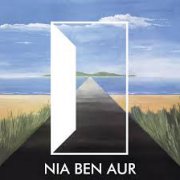 |
Nia Ben Aur (1975, 50.26) ***/T½ |
|
| Agoriad Cân y Gweithwyr Cwyngan Osian Cwsg Osian Pwy Yw? Tyred Croesi Hei Croeso |
Osian Yw Ei Enw ef Ri Tir Na N'Og O Osian Nia Ffa-la-la Cerdded Chi Sydd ar Fai Nia Ben Aur |
|
Current availability:
Mellotron used:
Nia Ben Aur is a first for Planet Mellotron: an album sung in Welsh. Originally performed at 1974's annual celebration of Welsh culture, the Eisteddfod, the rock opera (for want of a better term) was recorded the following year, although I can't imagine it found much of an audience outside the (admittedly million-strong) Welsh-language market. While very much of its time, it's far better than the typical sub-Lloyd Webber guff that was so prevalent during that era, or, indeed, Lloyd Webber himself [note: not difficult]. Combining elements of choral music, folk, rock'n'roll and mainstream balladry (!), highlights include Cwyngan Osian, Croesi, Tir Na N'Og and the closing title track, although a surfeit of female choir pieces (Pwy Yw?, Osian Yw Ei Enw Ef) and bad rock'n'roll (Ri, Cwsg Osian) do the work few favours.
Hefin Elis plays Mellotron, with a flute solo during Cwyngan Osian's fade, a fabulous cello/strings solo section on Croesi and more of the same, backing some narration, on Chi Sydd Ar Fai. While difficult to fully recommend, given that you can hear this on YouTube, you might consider it worth a go, if only for the splendid Mellotron work on Croesi.
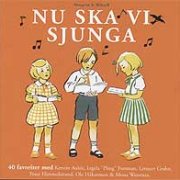 |
Nu Ska Vi Sjunga (2004, recorded 1972-73, 71.40) ***½/TT |
|||
| När Lillan Kom Till Jorden Små Små Fågelungar Trollfar i Snurreberget Nisse Tänker Sjöman Bli Vid en Väg På en Sten Bonden och Kråkan Goddag Min Fru Raska Fötter Springa Tripp, Tripp, Tripp När Jag Sist Gick ut att Vandra Veva Veva Positiv |
Kungens Lilla Piga Har du Sett Herr Kantarell? Trollmors Vaggsång Annikas Visa Plocka Svamp Tomtarnas Julnatt Om Våren, om Våren Här är Polisen Stinas Pepparkakssoldat Sov du Lilla Videung |
Leka Skola Vid Kattegatt Lasse Liten En Sockerbagare Fyra Små Grisar Säg När Kommer Våren Fjäriln Vingad Nu Så är det Jul Igen Tre Pepparkaksgubbar När Olle Fick Heta Pilleman |
Blåsippan ute i Backarna Står Nu Dansar Våren Om Jag Får en Flygmaskin Lilla Tussilago Tummeliten Litti Litti Li Mors Lilla Olle Blinka Lilla Stjärna Fröken Kissekatt Vi Går Över Daggstänkta Berg |
|
Current availability:
Mellotron used:
Nu Ska Vi Sjunga, or 'Now shall we sing', is one of the oddest records reviewed on this site, against stiff competition... Basically, it's a compilation of recordings of Swedish nursery rhymes, written by children's songwriter Alice Tegner, mostly recorded in the early '70s, provided for me by those nice people from Anekdoten. So why is it here? I'm sure you'll be completely unsurprised to hear that the instrumental accompaniment includes, alongside guitar and piano, an ARP 2600 and a Mellotron, so that answers that question. The music's very sweet, lots of short songs sung by enthusiastic-sounding people (male and female) in true school-hall style, sounding remarkably similar to many English-language equivalents. None of the melodies are familiar, with one obvious exception, proving that the Scandinavian tradition is very different to the British, although there are fewer stylistic differences than you might expect. The exception is a startlingly mournful version of Blinka Lilla Stjärna, or Twinkle, Twinkle, Little Star. Odd.
There's actually some interesting experimentation on offer here: Veva Veva Positiv features a backwards synth part, while Tomtarnas Julnatt and Om Våren, Om Våren's ARP patch is straight out of the prog songbook. Peter Himmelstrand's Mellotron parts (thanks for the info, Martin) are quite straightforward, unsurprisingly; När Lillan Kom Till Jorden opens with synth (definitely not Mellotron) flutes, with a Mellotron string line swelling up halfway through, although Små Små Fågelungar's flutes are Mellotronic. More flutes and strings on Kungens Lilla Piga, with all the other tracks sticking to strings. My theory, given the lack of recording information, other than dates (1972/3), is that some of the songs were recorded in a studio that already had a Mellotron, since it seems to be added pretty much at random; there's no obvious reason for it to be on one track any more than another, but then, I didn't arrange them, so what do I know?
Since this is meant to be used in nurseries and for small children at home, rather than listened to by sad Mellotron-obsessives who don't even understand the language, rating it is almost superfluous; it's a children's album and works perfectly well in that context. Since it didn't make me grit my teeth even once, I think ***½ is quite fair. The Mellotron work is actually pretty good, but I'm not sure I can recommend a purchase to the average adult listener. Good at what it does.
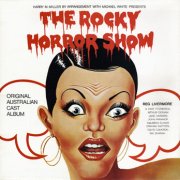 |
The Rocky Horror Show: Original Australian Cast Album (1974, 42.11) ***½/T |
|
| Science Fiction Wedding Song Over at the Frankenstein Place Sweet Transvestite Time Warp The Sword of Damocles Charles Atlas Song Whatever Happened to Saturday Night |
Touch a Touch Me Once in a While Eddie's Teddy Planet Schmanet Janet It Was Great When it All Began/I'm Going Home Super Heroes |
|
Current availability:
Mellotron used:
Does Richard O'Brien's Rocky Horror (Picture) Show really need any introduction? The stageshow reached Australia (Sydney, to be precise) in 1974, apparently the first production outside the UK and US, starring one Reg Livermore as Frank-N-Furter, the soundtrack album appearing within months. It's clearly a studio recording, although bootlegs of the stageshow exist. Unless you're a Rocky Horror obsessive, it's... well, it's just another Rocky Horror soundtrack, with minor differences to all the other Rocky Horror soundtracks (currently sixteen in total), chiefly (of course) in the shape of the cast, although the tracklisting differs slightly from the better-known versions, too.
Unsurprisingly, the musical arrangements also differ slightly from the original cast album and the film, guitarist/musical director Roy Ritchie changing the odd harmony here and lyric there. He also doubles on Mellotron, adding what sounds like background saxes to The Sword Of Damocles, a handful of string chords to I'm Going Home and a brief choir part on Super Heroes, just about scraping one 'T'. Well, Rocky Horror minutiae fans may wish to hear this, the rest of us can probably stick with the original cast album. Incidentally, the bootleg mentioned above is Mellotron-free, so the theatre band obviously didn't use one live.
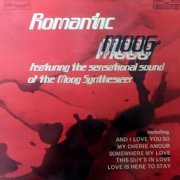 |
Romantic Moog (1974, 32.11) **/TT |
|
| My Cherie Amour Like Someone in Love A Lover's Concerto I Love You Because Love is a Many Splendored Thing Somewhere My Love (Lara's Theme From "Dr. Zhivago") This Guy's in Love Love is Here to Stay |
What the World Needs Now is Love True Love Portrait of My Love And I Love You So |
|
Current availability:
Mellotron used:
The Contour label's Romantic Moog is what is known as (a technical term here) a 'charity shop special' - 'thrift store' if you're from across the pond. Knocked out for next to nothing, it would've sold respectably in its day, probably from non-standard outlets (newsagents and the like), as no self-respecting record shop would've gone near this stuff. In this particular case, the producers (Chris Harding and Lionel Burdge, who, amazingly, put their name to this) obviously assembled a small ensemble of piano, (very gently played) drums, bass and synth, any of whom could've been either of those two fine gentlemen, bashing out cheeso 'Moog' arrangements of the kind of love song your aunty would've listened to back in the '70s, most of them old enough that I couldn't actually tell you who recorded them originally. Nor would I wish to. It's easy to see this as side-splittingly awful (and I do), but, in actuality, it's just awful. No wonder I found a badly scratched copy in a 'chazzer' in a particularly rough area for under a pound. I was still ripped off.
A sensibly anonymous muso adds Mellotron strings to a few tracks, with faux-orchestral parts added to Somewhere My Love (Lara's Theme From "Dr. Zhivago"), This Guy's In Love, Portrait Of My Love and (in particular) And I Love You So, which, as you might expect, add precisely nothing to the arrangements. Top marks for terribleness, by the way, go to the particularly unsuitably modulated patch on Portrait Of My Love, although it's all pretty dreadful, truth be told. Interestingly, this didn't actually have me reaching for the sick-bucket, thus the relatively high rating above; more boring than puke-inducing.